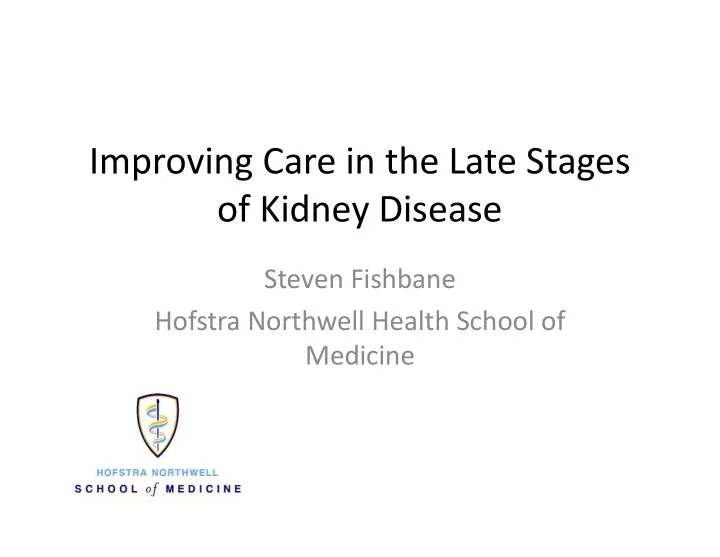

Improving Care in the Late Stages of Kidney Disease Steven Fishbane Hofstra Northwell Health School of Medicine
What Should be Accomplished in late Stages of CKD? • Determine suitability for ESKD treatment • Educate on modality choices – Hemodialysis, peritoneal dialysis, transplantation • Transplant- facilitate complicated process • PD- Full assessment and get timing right • HD – Place AV fistula well in advance • Other
Costs in the Peri-Dialysis Period
Kidney Int. 2014 Aug;86(2):392-8
Preparation for ESKD • 80% of U.S. hemodialysis patients start with catheter • 65% of dialysis patients start with a hospitalization • Only 9% start on home dialysis • Only 2.6% receive preemptive kidney transplantation • 60% state never received education on choices
Healthy Transitions in Late Stage Kidney Disease History 5/31/2016 563 total 2011 1/2014 1/2016 patients Began Began Completed from Development RCT RCT inception 10/2012 9/2014 2/2016 Started Partnered First HCIA with NKF pilot – phase payment patient model
HT Program Committee Structure Program Steering Committee Joe Schulman S. Fishbane, MD Sofia Agoritsas Candice Halinski Chrystal Flourentzou Medical Advisory Board Committee NSLIJ Medical Group Nephrologists E. Ilamathi, MD LHH Nephrologists ACP Nephrologists A. Husain, DO Program Management Committee/Daily Operations S. Fishbane, MD Craig Gordon Sofia Agoritsas Terry Tan Candice Halinski Vipul Sakhiya Chrystal Flourentzou Mary Rzeszut A. Hazzan, MD Finance and Payment Advanced Illness Committee Patient Management Review Model Committee H. Koncicki, MD HT RN's DOM Leadership S. Fishbane, MD S. Fishbane, MD Sofia Agoritsas Terry Tan A. Hazzan, MD S. Fishbane, MD Chrystal Flourentzou Chrystal Flourentzou Matthew Jelavic Sofia Agoritsas Candice Halinski Ella Parys Candice Halinski Vipul Sakhiya Richard Miller Vipul Sakhiya Mary Rzeszut Joseph Schulman Mary Rzeszut Chrystal Flourentzou HT RN's Candice Halinski IHI
Healthy Transitions in Late Stage CKD • Improve poor national outcomes – Break Through Barriers: • Promote evidence based practice • Nursing care management – Collaborating with nephrologists • Informatics – Decision support – Nursing efficiency – Bring protocols to life
HT Program Components • Home visits • HT Countdown to Fistula Program • Healthy Transitions PhoneLink • Universal dietary consultation • Medication review • HT Safe at Home Program • Social work - depression and anxiety screening • Conservative Care Management Program • Physician score card
HT Late Stage Kidney Disease Program
Potential for Stage 4/5 Care Management HT Benchm Annual Cost Potential Key Savings U.S. Program ark Savings per Annual U.S. Areas 2013 2012- % ∆ ESRD Savings 2016 Change Patient Increase in Preemptive 2.6% 10% 7.4% $56,000 $1.7 Billion Transplantation Increase in Outpatient 30% 65% 35% $22,000 $400 Million Dialysis Starts Avoid Catheter 19% 60% 39% $15,000 $420 Million per HD Patient Increase in Home 8% 24% 16% $20,000 $760 Million Dialysis Total $3.3 Billion
HT Pilot Results U.S. Average HT Results Implied Savings Hospitalizations 1.21-1.99 1.14 Mortality 0.14 0.04 Modality Selection 0.35 0.68 Preemptive Transplantation 2.6% 11% $60,000 per year Home Dialysis 7% 27% $20,000 per year HD Catheters 81% 26% $30,000 HD AV Fistulas 24% 68% Same 20% 65% $25,000 one time Start HD as Outpatient
Why is Advanced Care Management Needed? • Nephrologists are very busy • Late stage CKD care episodic – Complex processes • Fragmented care • Resistance – Nephrologists – Patients • Patients who are never seen by a nephrologist
Regulatory Scan Changes in Payment Legislature • Medicare Access & CHIP Reauthorization Act of 2015 (MACRA) – Alternative Payment Models (APMs) – Merit Based Incentive Payment Systems (MIPS) • Kidney Disease – Integrated Care Management – ESCOs (2014) – Dialysis Integration legislation – CMS Updates to Policies and Payment Rates for End-Stage Renal Disease Facilities for CY 2016 and Changes to the ESRD Quality Incentive Program • Specifically asks for new models for late stage CKD care / payment
Can an HT Type Program Work More Broadly? • Yes • Any nephrology practice could provide care management services – Would require a practice nurse at a minimum – Ideally, centralized informatics • Centralized care management services • All would cost money – Better outcomes would require a new payment model
The End
Recommend
More recommend